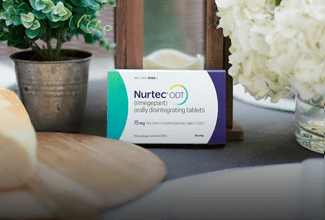
Courtney T
Actual Nurtec ODT Patient
Menstrual Triggers for Migraine
Breaking down common menstrual triggers
“Whenever my cycle comes, I can always count on two things: cravings and migraine attacks. The good news is, my doctor prescribed me Nurtec ODT to help me with my migraine attacks.”
Individual results may vary.
Patients were invited to share their experiences on Nurtec ODT.
All content was accurate at the time of publication.
What are menstrual triggers?
Nearly 2 out of 3 women with migraine experience attacks while on their period
If you know the pain of migraine while being on your period, you’re not alone. Get ahead of migraine attacks triggered by menstruation with a few helpful tips.
How does estrogen affect migraine?
Fluctuations in hormones — specifically estrogen — throughout different stages in life, can bring about new migraine symptoms and changes in symptom severity.
During Menstruation
Two days before your period and in the first three days after it starts, you may experience migraine attacks which are likely triggered by hormonal changes related to menstruation.
This is due to changing estrogen and progesterone levels, resulting in longer and more intense attacks.
During Pregnancy
Many people have reported that their migraine symptoms improved during pregnancy, most notably during the last six months.
After giving birth, hormone levels either increase or decrease which can intensify migraine attacks.
Changes in hormone levels & migraine
Changes in hormone levels can directly affect migraine severity. Take a look at how different hormonal stages can affect migraine symptoms.
Perimenopause is the stage right before your body begins menopause.
As your hormones fluctuate and estrogen levels drop, your periods become more irregular. This can result in longer and more intense migraine attacks.
Menopause is the stage right after perimenopause.
Your periods will stop permanently after your estrogen levels go through a sudden decline at the end of perimenopause.
Once you enter menopause, hormone levels become stable and remain low. Many people find that their migraine attacks become less frequent or go away completely once their periods stop.
Hormone replacement therapy (HRT) which usually contains estrogen and progestin, can be used to treat symptoms brought on by menopause.
HRT for treating menopause raises estrogen levels, which may cause migraine symptoms to get worse. On the other hand, research shows that HRT can reduce the frequency of attacks in people with migraine who are triggered by fluctuations in hormone levels.
People on HRT for gender-affirming therapy may experience a change in the frequency or severity of their migraine attacks.

Ellie W
Actual Nurtec ODT Patient
Individual results may vary.
Patients were invited to share their experiences on Nurtec ODT. All content was accurate at the time of publication.
Find relief from migraine attacks triggered by your cycle with the only medication proven to treat & prevent, all in one.
Is it that time of the month?
Take action on treating your migraine & preventing future migraine attacks with Nurtec ODT.



$0* copay offer
With the copay card, eligible commercially insured patients can save on out-of-pocket costs and may pay as little as $0*
*Eligible commercially insured patients can, for one time only, access Nurtec ODT at no cost while benefits are being verified for one prescription fill, with a maximum of 16 tablets total. Insurance coverage must be approved by the payor for patients to continue receiving Nurtec ODT with no out-of-pocket cost. No membership fees. Only available for commercially insured patients. This is not health insurance. Maximum annual benefit of $7,000 applies. The full terms and conditions can be accessed at nurtec.com/savings#terms-and-conditions.